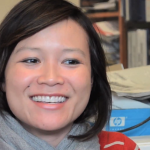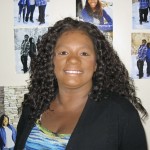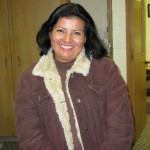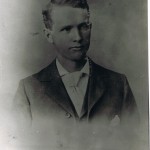What makes a woman The Other? Race? Ethnicity? Sexual orientation? Skin color? Wanting a family, not a career, first? Or does a woman become The Other by just being a woman, not a man?
I’m asking those questions after interviewing five female graduate students at Yale’s School of Drama who identified themselves as The Other (watch our video here) and after thinking about my mother, a graduate student of drama at Yale almost four generations earlier. She earned a Master of Fine Arts in theater production in 1935.
Today’s students call themselves The Other for strikingly different reasons. Delilah Dominguez, 24, a native of Bastrop, Texas, identifies herself as small-town, “queer and a minority woman”—the first member of her family to attend college. A student of dramaturgy and dramatic criticism, she feels uncomfortable in the privileged world of theater at Yale and bristles at the “socio-economic disparities” she observes. Having volunteered at a Branford hospice, she plans to switch careers and enter social work.
Keri Klick, a 22-year-old student of sound design who is also the first college graduate in her family, defines herself as The Other “because I have excelled quickly in a male-dominated industry—but with the sole intention of preparing myself to have a career in theater production eventually.” She talks of getting married and starting a family young. To ensure a life focused on her family, perhaps she will earn a Ph.D. and teach. “I’m going to make it work somehow,” she says.
First-year acting student Michelle McGregor, 24, of Wilmington, N.C., considers herself The Other for three reasons. She recalls her first day of classes at Yale. She felt uneasy, as a private person who viewed theater as scripts to be analyzed, “rolling around on the floor, acting like children, being goofy”—being pushed immediately to open up to people and to analyze herself. Though “school is great” now, she remains sensitive to her life within the seemingly safe, “strange bubble” that is Yale, when gunshots at night and people on the street asking for help remind her of the harder-edged reality that is much of New Haven. And, while working in New York City before arriving at Yale, she became increasingly aware of women needing to “care very much about their appearance,” while men “can get away with being disheveled.”
Prema Cruz and Carmen Zilles, acting students, are conscious of their ethnic heritage. Zilles, a 24-year-old Mexican-American, says she is the only Hispanic member of her second-year class. At the drama school, which accepts only one acting student for every 80 who apply, she wonders sometimes whether “that has to do with why I got in here.”
As a scholarship student at Sarah Lawrence College, where “most people had a lot of money, I felt like a huge Other,” she says, turning philosophical. “I sometimes have the feeling everyone is an Other.” When she visits her family in Mexico she says she feels “very Other.” “Sometimes,” she adds, “I feel very American.”
Yale’s drama school, with its free tuition, “feels very equal,” she says. But ethnicity remains an issue. “It’s interesting that people don’t talk about it,” she says, “but it’s definitely there.” She worries that she will be limited to Hispanic acting roles after Yale.
“There’s not a whole lot of plays about the Latin American experience in this country,” she says. She has already been cast in a Yale play as a Cuban. “I’m not Cuban,” she says. “I don’t necessarily walk around feeling like a Hispanic person. I just kind of walk around feeling like a person.”
Born in the Bronx, N.Y., Cruz, a 26-year-old, first-year acting student, grew up in Sacramento, Calif., with her African-American mother. Only recently has she begun spending much time with her Dominican-born, Spanish-speaking father in New York.
They visited the Dominican Republic together. Cruz, who considers herself “a black woman” and is much darker than her father, found herself faced with a wrenching moment of decision in a culture with “very blatant racism.” She needed to board a flat-bed truck that served as a bus, with dark-skinned women sitting in the back and light-skinned locals sitting inside the truck’s cab.
Her father knew to sit inside the cab, Cruz recalls, her eyes tearing. “I didn’t know what to do. Do I sit in the back or the front with my father? I’ll never forget that moment.”
Cruz, who was “never raised to think about color,” has not dated African-American or Dominican men, only white men. Whomever she marries, her children “must know who they are and where them came from”—the stories and roots of their parents and grandparents. She says, “It’s important to know what those roots dig into, what they are soaking up.”
My mother, Rita, was the daughter of Loren Haskin and Hettie Fletcher, white, Methodist, farm-family Kansans who moved west to Pomona, Calif., at the beginning of the twentieth century and never attended college. Rita graduated in 1932 from Scripps, a new women’s college in Claremont, Calif., where she was known for being, in the words of Groucho Marx, “well over four feet” and nicknamed “Birdie.”
Childhood polio had required annual surgery, recalled Marion Jones, a cousin, “to lengthen and keep her spine as even as possible. She must have suffered great pain and I thought she was very brave.” Virginia Willis, a Scripps classmate and childhood friend, said, “She had so much illness but in all the years I never heard her complain.”
Many of her classmates regarded Scripps as a finishing school preparing them for marriage and a family, not graduate school and a career. But Rita pursued her interest in theater production at Scripps and beyond (for a summer 1931 course in play production at Claremont Colleges she earned an A).
She applied to Yale. Isabel F. Smith, dean of Scripps, recommended her as “quick and humorous; diligent, conscientious and ambitious.” Smith concluded: “I have seen her take part most admirably in several plays, but she has a slightly noticeable spinal curvature and it may be that her decision to go into production has been influenced by a realization of this handicap.”
Yale accepted Rita. My grandparents scraped together Yale’s annual tuition of $350 and in 1932 my mother started the three-year production course of Yale’s department of drama where, according to department rules, “only one third may be women.”
Loren Ghiglione



























I live in a predominately white state. When the Dr I work for, an Asian-American, first moved here from San Diego, she looked around & thought “there are no “others” here.
Recently, she & I were working with a Russian immigrant, & I said to her, “see, there are lots of “others”, you just can’t see them.